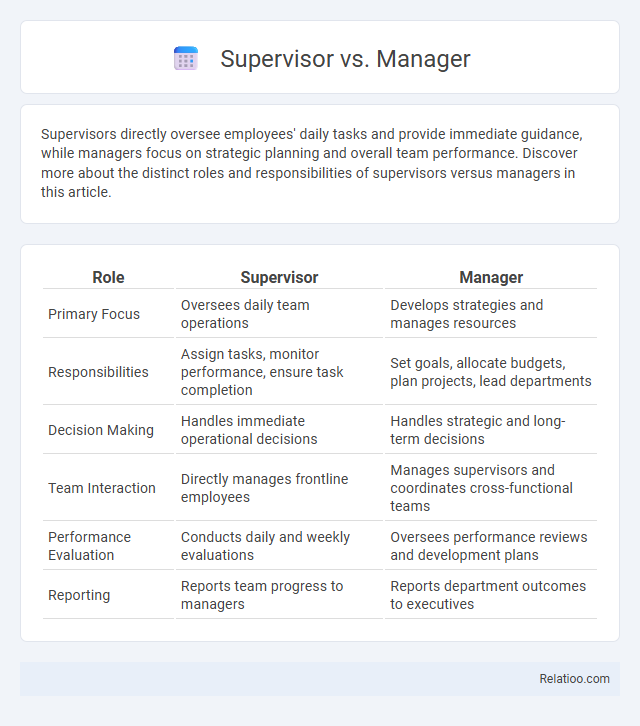Supervisors directly oversee employees' daily tasks and provide immediate guidance, while managers focus on strategic planning and overall team performance. Discover more about the distinct roles and responsibilities of supervisors versus managers in this article.
Table of Comparison
| Role | Supervisor | Manager |
|---|---|---|
| Primary Focus | Oversees daily team operations | Develops strategies and manages resources |
| Responsibilities | Assign tasks, monitor performance, ensure task completion | Set goals, allocate budgets, plan projects, lead departments |
| Decision Making | Handles immediate operational decisions | Handles strategic and long-term decisions |
| Team Interaction | Directly manages frontline employees | Manages supervisors and coordinates cross-functional teams |
| Performance Evaluation | Conducts daily and weekly evaluations | Oversees performance reviews and development plans |
| Reporting | Reports team progress to managers | Reports department outcomes to executives |
Understanding the Roles: Supervisor vs Manager
Understanding the roles of a supervisor and a manager is crucial for effective leadership and delegation in your organization. Supervisors typically oversee day-to-day operations and directly guide frontline employees, ensuring tasks are completed efficiently and according to standards. Managers have a broader scope, responsible for strategic planning, resource allocation, and aligning team objectives with organizational goals, making your delegation of responsibilities more structured and impactful.
Key Responsibilities of Supervisors
Supervisors are responsible for overseeing daily operations, ensuring team productivity, and enforcing company policies. They directly manage employees, provide training, monitor performance, and address workflow issues to meet organizational goals. Unlike managers who focus on strategic planning, supervisors emphasize task execution and effective delegation to optimize team efficiency.
Core Duties of Managers
Managers oversee team performance, set strategic objectives, and allocate resources to ensure project success, distinguishing their role from supervisors who primarily handle day-to-day task coordination. Core duties of managers include planning, organizing, leading, and controlling organizational activities to achieve business goals efficiently. Effective delegation is a critical managerial function, enabling managers to assign tasks based on team members' strengths while maintaining accountability and fostering employee development.
Authority and Decision-Making Power
Supervisors typically hold limited authority, focusing on day-to-day team oversight and task assignment, while managers possess broader decision-making power, including strategic planning and resource allocation. Delegation involves the transfer of specific responsibilities and authority from managers or supervisors to team members, enabling efficient workflow and accountability. Your understanding of these roles enhances leadership effectiveness by clarifying the scope of authority and optimizing decision-making processes within your organization.
Skills Required for Supervisors
Supervisors require strong communication and interpersonal skills to effectively guide teams and resolve conflicts, along with organizational abilities to oversee daily operations and meet deadlines. Unlike managers who focus on strategic planning and decision-making, supervisors excel in hands-on leadership and task delegation to ensure productivity. Proficiency in delegation involves assigning tasks clearly, monitoring progress, and providing feedback, which is critical for supervisors to maximize team efficiency and accountability.
Skills Required for Managers
Managers require advanced leadership skills, including strategic thinking, decision-making, and effective delegation, to coordinate teams and achieve organizational goals. Strong communication and conflict resolution abilities are essential for managing diverse groups and ensuring project alignment. Unlike supervisors, who typically focus on day-to-day team oversight, managers must balance operational responsibilities with long-term planning and resource allocation.
Supervisory vs Managerial Leadership Styles
Supervisory leadership emphasizes direct oversight, task guidance, and hands-on involvement in day-to-day operations, fostering team accountability and skill development. Managerial leadership focuses on strategic planning, decision-making, and broader organizational goals, aligning team efforts with company vision. Understanding these leadership styles helps you delegate tasks effectively, balancing control with empowerment for optimal team performance.
Impact on Team Performance
A supervisor directly oversees daily tasks, ensuring team members stay aligned and productive, which positively impacts team performance by maintaining consistency and addressing issues promptly. A manager adopts a broader role, planning, strategizing, and fostering growth opportunities that enhance overall team effectiveness and long-term success. Effective delegation from both supervisors and managers empowers your team by distributing responsibilities appropriately, boosting morale, accountability, and efficiency.
Career Progression: Supervisor to Manager
Career progression from supervisor to manager involves expanding leadership responsibilities, strategic decision-making, and overseeing broader team functions beyond daily task supervision. Supervisors focus on direct team guidance and operational execution, while managers drive goal alignment, resource planning, and performance evaluation across departments. Effective delegation skills become essential during this transition, enabling managers to empower subordinates, optimize workflow, and focus on higher-level organizational objectives.
Choosing the Right Role for Your Career
Choosing between supervisor, manager, and delegation roles requires understanding their distinct responsibilities and career impacts. Supervisors oversee daily tasks and direct teams closely, while managers focus on strategic planning and resource allocation. Effective delegation skills enhance leadership effectiveness in any role, helping you advance your career by balancing control and empowerment.

Infographic: Supervisor vs Manager
 relatioo.com
relatioo.com